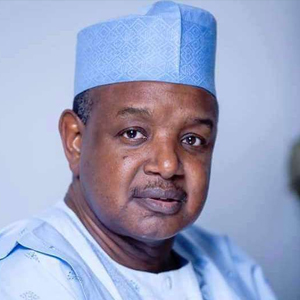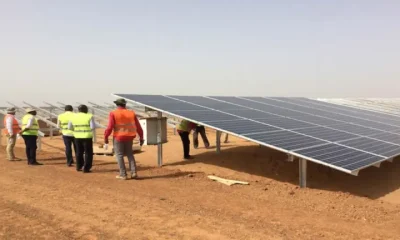News
FG Approves ₦2.2 Trillion Supplementary Budget

The Federal Government on Monday approved a N2.18tn supplementary budget for the 2023 fiscal year.
This would fund urgent issues including national defense and security. The supplementary funding was also targeted at providing welfare packages for workers and Nigerians at large.
The Minister of the Budget and Economic Planning, Abubakar Bagudu, disclosed the details of the funding to State House Correspondents at the end of this week’s Federal Executive Council meeting President Bola Tinubu chaired at the Aso Rock Villa.
Bagudu said, “N605bn for national defense and security is to sustain the gains made in security. It will accelerate the gains in that sector as the funds will be made available to security agencies before the year runs out.
“Equally a sum of N300bn was provided to repair bridges, including Eko and Third Mainland bridges, as well as construction, rehabilitation and maintenance of many roads nationwide before the return of the rainy season.
“The sum of N210bn was provided for the payment of wage Awards. In negotiation with the Nigeria Labour Congress, the federal government agreed to pay N35, 000 each to about 1.5 million employees of the federal government and that covers September, October, November and December 2023.”
Bagudu explained the underpinnings of the N400bn cash transfer payments the Council approved, saying, “You may recall that the federal government secured a $800m loan from the World Bank to pay cash transfers of N25,000 to 15 million households. The $800m is for two months, October and November.
The Minister also disclosed that “the President graciously approved that an additional month should be funded by the federal government and that is what this N100bn is for.”
He added that the Council also approved N200bn for seed, agricultural input, supplies and agricultural implements and infrastructure in order to support expansion of production, while N100bn was set aside to improve infrastructure in the Federal Capital Territory.
The Independent National Electoral Commission also got N18bn for the conduct of elections in Bayelsa, Kogi and Imo in November.
To fulfill its palliative promises to Nigerians, FG voted N5.5bn for the take-off of the student loan scheme in January 2024.
“The supplementary budget also includes N8bn for the take-off grant of new ministries and N200bn for capital supplementation to deal with urgent requests made to the President from various parts of the country,” Bagudu said.
While the FG intends to fund the extra-budgetary spending from revenues accruable to it from its recent policies like the removal of subsidy on petrol, it is leaving no stones unturned as it ordered the DMO to raise the nation’s domestic borrowing ceiling to source for more money from the debt market to support its planned expenditures when necessary.
“It is not anticipated that there would be borrowing, but to the extent there will be, the debt management office will raise it. This is not recourse to Ways and Means,” the Minister explained.
The former Kebbi State Governor also reiterated the administration’s commitment to maintain the January-December budget implementation cycle.
He cited the legislative and executive backgrounds of the President, Vice President, and other members of the Council, stating that the “budgeting process is benefiting from this collective wisdom and would foster mutual respect for institutions which will narrow the areas for dispute.”
Former President Muhammadu Buhari in January, signed the 2023 Budget of N21.83trn along with the 2022 Supplementary Appropriation Bill into law.
Speaking at the signing of the eighth and final annual budget of his Administration, the Buhari said the aggregate expenditures of N21.83 trn, represented an increase of N1.32 trn over the initial Executive Proposal for a total expenditure of N20.51 trn.
The former President explained that the 2022 Supplementary Appropriation Act would enable the administration to respond to the havoc caused by the recent nationwide floods on infrastructure and agriculture sectors.
Meanwhile, Nigeria’s total public debt may hit N118.37tn in the next three years, findings by The PUNCH have shown.
The figure was based on analysing Nigeria’s current debt profile and the debt projections in the Medium Term Expenditure Framework and Fiscal Strategy Paper 2024-2026.
According to the new MTEF/FSP, the Federal Government plans to take N26.42tn loans between 2024 and 2026.
The fiscal policy also indicates that debt servicing will gulp N29.92tn in three years.
The data show that the national government plans to borrow N7.81tn in 2024, slightly less than the N8.84tn targeted for the same year in the previous MTEF/FSP.
A breakdown for 2024 shows that the Federal Government plans to get N6.04tn from domestic lenders and N1.77tn from foreign creditors.
By 2025, the Federal Government plans to borrow N8.54tn, which is also less than the N10.62tn targeted for the same year in the previous MTEF/FSP.
Despite the rising debt, the Federal Government has insisted that it will stick to its borrowing plan.
Over the years, Nigeria’s low revenue generation has pushed the government to borrow more.
However, President Bola Tinubu recently expressed his administration’s commitment to breaking the cycle of overreliance on borrowing for public spending and the resultant burden of debt servicing it placed on the management of limited government revenues.
Tinubu recently said the country could not continue to service its debt with 90 per cent of its revenue.
He noted that the country was heading for destruction if that continued.
The President said, “Can we continue to service external debts with 90 per cent of our revenue? It is a path to destruction. It is not sustainable. We must make the very difficult changes necessary for our country to get (wake) up from slumber and be respected among the world’s great nations.
News
Woman killed while crossing road in Anambra

The Federal Road Safety Corps (FRSC), Anambra State Sector Command, has confirmed the death of a woman in an accident at Okpoko Market on the Asaba-Onitsha Road.
The Sector Commander, Mr Adeoye Irelewuyi, who confirmed the accident to journalists in Awka on Thursday, said that the woman was hit while she was crossing the road.
He said that the accident, which occurred on Wednesday, involved a commercial tow truck with registration number XA550BMA.
“Eyewitness report reaching us indicates that the truck was towing a vehicle in an uncontrollable speed along the axis.
“The vehicle that was being towed got detached from the tow truck.
“It hit and killed a female adult, who was said to be crossing the road, while the tow truck continued its movement.
“FRSC rescue team came to the scene and took the woman to Toronto Hospital, Onitsha, where she was confirmed dead and her body deposited at the hospital’s mortuary,” he said.
While sympathising with the family of the dead, the sector commander urged motorists, especially tow truck drivers, to exercise a high level of professionalism.
He also urged the drivers to always use standard equipment and avoid speeding.
News
LASG’s maize palliative impactful, says poultry association chair

The Chairman, Poultry Association of Nigeria (PAN), Lagos State Chapter, Mr Mojeed Iyiola, said the state government’s maize palliative to members of the association made a positive impact on the sector.
Iyiola said this in an interview with the News Agency of Nigeria (NAN) on Thursday in Lagos.
“We received about 150,000 tons of maize in February from the Lagos State government as palliative to cushion the effect of high feed prices.
“The major benefit of the palliative is that it actually cushioned the cost of production for most poultry farmers in the state.
“The palliative was beneficial as it made the cost of some poultry produce, especially eggs to drop,” Iyiola said.
He noted that prior to the palliative, a crate of egg was sold between N3,500 and N3,700 at the farm gate, but after the palliative, it now sells between N3,200 and N3,400.
According to the PAN chair, retailers and middlemen who sell from N3,800 to N4,200 do that for their personal gain.
“We have urged our members to sell their eggs at reasonable prices following the receipt of the palliative from the government.
“We appreciate the Lagos State government for the palliative but we also urge the federal government to do likewise, to further reduce the cost of production in the sector.
“This will consequently lead to drop in the prices of all poultry produce across board,” he said.
He said the palliative was shared among financial members of the association at no extra cost.
“As an association we shared the grains equally across PAN’s eight zones in the state equally. We also mandated each zone not the sell even a grain of the maize.
“We, however, considered new poultry farmers who wanted to the join the association as beneficiaries of the palliative,” said Iyiola.
He noted that through the palliative, more poultry farmers were recruited into the association.
“The maize was shared only to poultry farmers and not feed millers, it is the major component of poultry feed formulation,” he said.
-

 News6 days ago
News6 days agoFG To Provide Solar Subsidy In Nigeria Through $750 Million World Bank Loan
-

 Headline6 days ago
Headline6 days agoLassa Fever Kills 150 In Nigeria — NCDC
-

 Headline6 days ago
Headline6 days agoUnknown Gunmen Abduct Channelstv Reporter In Port-harcourt
-

 News6 days ago
News6 days agoLagos Court Grants Emefiele N50m Bail
-

 News6 days ago
News6 days agoBreaking…Naira abuse: Court sentences Bobrisky to 6 months in custody
-

 Foreign6 days ago
Foreign6 days ago3 teens arrested in Germany for allegedly plotting terror attack
-

 Business5 hours ago
Business5 hours agoSeplat Energy celebrates a decade of Dual Listing with Bell Ringing Ceremony at Nigerian Stock Exchange







